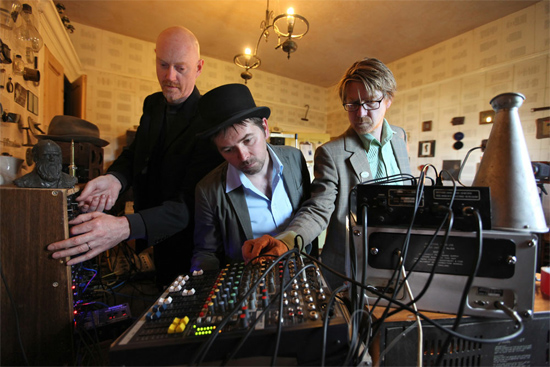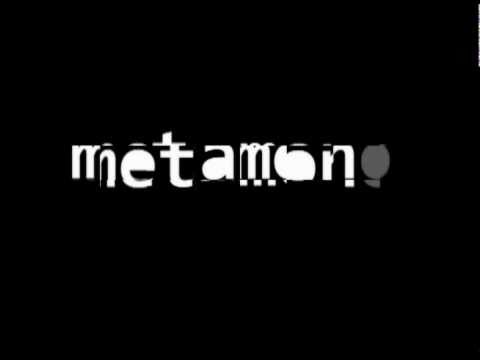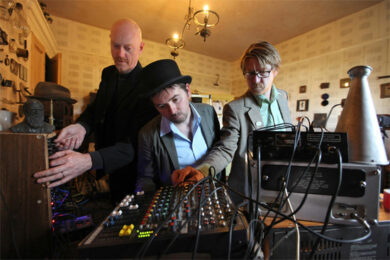How, then, to describe Metamono, the Crystal Palace based trio who are kicking against the stifling orthodoxies of electronic music in the digital and computer age? “Three generations of Dr Whos dealing with a particularly recalcitrant Tardis”, offered a friend of band member Jono Podmore, aka Kumo, collaborator with among others, Irmin Schmidt of Can and responsible for the brilliant, painstaking editing job that resulted in The Lost Tapes.
Given the way they grapple with vast banks of ancient and modified analogue equipment, which is wonderfully subject to alterations in room temperature, humidity, even radio waves, and given the way they fly about the history and possible future of electronic music, it’s strikingly apt. “A futurist skiffle group”, they flippantly offer themselves, referring to their penchant for homebuilt equipment. Paul Conboy constructed his own modular synthesizer “from diagrams on the internet” and, he assures the Quietus, “apart from the odd wire hanging out and the occasional bit of smoke, it actually works.”
Mark Hill, who is also a fine artist, meanwhile, scavenges vintage equipment from car boot sales and skips. “I’ve been doing it since I was a kid.” He bought an antique synthesizer when he was 18, and, despite having no one with whom to play it, stuck to it. “I was just waiting for the right people to be in the band with. It become worth more and more money but it was part of me. Gathering all the stuff around us that we make the overall unit with, it involves a very organic, patient approach.”
Who, and what are Metamono? The first, necessary point of reference is their manifesto.
Deploring the easy ubiquity of and access to sound, Metamono made a conscious decision that in order to liberate themselves creatively, they would have to set certain limitations on themselves. And so, declare, the group,
METAMONO WILL NEVER
- use a microphone
- use digital sound generation or sampling
- use mechanical sound generation
- use digital sound processing
- make overdubs
- be afraid of mono
- remix
METAMONO WILL ONLY
- use analogue electronic sound generation
- use analogue electronic sound processing
- use digital recording and basic editing when no alternative is available
- compose and mix simultaneously
- build their own or play used instruments
There are vague precedents for this sort of declaration – Lars Von Trier and Thomas Vinterberg’s Dogme 95 manifesto, for example, in the world of cinema, or Matthew Herbert’s Personal Contract For The Composition Of Music, which sets out its own, strict set of principles for his sample based operations. Nor are Metamono the only electronic artists to opt for analogue over digital. However, Metamono are unique in both the rigour and the sheer, hands on gusto with which they work. All of which makes them a bracing and brilliant antidote to the vast excess of commercial digitalia with which we are currently supersaturated, not least thanks to the rise of technologies like the Internet, which, says Jono, “codifies and defines things until they become static. It happened with the printing press. The codifying and distribution of language, which had been in enormous and constant development – Shakespeare made up words all the time – suddenly stopped. The content of what’s coming out of the radio is static.”
Or, as Mark puts it, “It doesn’t free your mind, it shuts it down.”
“Our list of rules is very limited,” says Jono. “A good analogy is Sumo. There are only about four rules to Sumo wrestling. But the effect those rules have on the whole set-up is incredible, it’s a massive extrapolation. Same with us.”
“Among the most important things about this manifesto is not being able to use a microphone,” adds Mark. “That’s what makes everything quite difficult and quite focussed. You’re just left with what the machines can do.”
And what machines. Their list of equipment is a joy to read in itself, a poetry of lost futurisms. Here is but a sample – ARP 2600; Roland MC 202; handmade ring modulator/filter unit; handmade modular synthesiser; handmade theremin; Soundcraft spirit folio console; Shaftsbury squall pedal; Coron drum synth (clone); Eddystone EC10 MK2 SW radio receiver; valve radio; Crybaby wah pedal.
Just what Metamono and their machines can do is evident on their latest vinyl EP, Parcel Post. On ‘Mattressphere’ (which takes its title from a snatch of radio scrupulously and serendipitously caught live by radio monitor Mark during the recording process), ‘Glueshoes’ and ‘Jabjab’ are reminiscent of Stockhausen (had he ever chosen to give free roam to the playful and ebullient side of his nature), of the more upbeat figures of the BBC Radiophonic Workshop like John Baker, Herbie Hancock’s 1973 futurist jazz masterpiece Sextant, of the early days of Acid, when the likes of Mr Fingers and A Guy Called Gerald were grappling with primitive devices to such potent effect. “The 303 bassline generator was originally made for guitarists to jam along their shitty chords to,” says Paul. “It was cheap, available, discarded technology.”
Above all, however, Metamono remind of Metamono – they are their own pocket universe, in which atoms ping about in a lucid frenzy of invention, sounds roam, zing and arc freely in a virgin, jet black space unencumbered by contemporary techniques like compression, that method of levelling out dynamic range which accounts for that “airless, awful, plastic, lack of space” in so much mainstream recording. Jono, again; “The clarity of mono recording allows for that – in mono, you can always hear what’s going on. We were sold stereo on the idea that you’d have all this space, depth and whatever – you don’t need it. It comes back to that military-industrial complex view of music, trying to sell you as many boxes as possible.”
Another striking feature of the Metamono-verse is that, without lapsing into any sort of high BPM, crushingly enforced hedonism, their music is irresistibly upbeat. Not for them, the use of electronica to denote angst, dark clouds across a post-apocalyptic landscape, or dystopian gloom. The sheer, peppery effervescence of ‘Mattressphere’ announces this at once. Quite simply, and of all things, it makes you smile.
“Funny, when we first sorted out, I thought the music was going to turn out to be chin-scratching, apocalyptic, avant garde. But there was a very deliberate decision that we would have a cheerful theme,” recalls Jono. “It was on the eve of the UK general election, of all times, in 2010. The challenge was, make cheerful, happy stuff. And some of the pieces that came out of that session were some of our best pieces. But no matter how cheerful and diatonic these sounds are, it doesn’t stop you from twisting things to buggery. That’s where a lot of the excitement comes from – the twisting of the sounds, rather than stacking up loads and loads of layers.”
Previous releases like Tape EP, Band Theory and The Enemy Above have been on supposedly obsolete formats like cassette and vinyl. This, coupled with the use of devices commonly associated with all our electronic yesterdays, inevitably tempts one to reach for labels like “retro-futurist”. But Metamono are having none of the “retro” – they argue against the enforced obsolescence of technologies that have only been displaced for the sake of ease and convenience, and also against the right of state-of-the-art technologies to preserve a monopoly on the present day and foreseeable future. “It’s not nostalgic, we’re not hankering for some golden past. It’s about creating a richer present,” says Paul. They give short shrift also to the argument that laptop technology, for instance, has democratised music-making.
“What worries me about this idea of the ‘democratising’ effect of laptops is that they’re usually made by two companies, Mac and Microsoft, with Microsoft writing all of the software, even for the Macs,” says Jono. “So it’s not really as democratic and full of choice as it might appear. Plus, for the money you spend not just on the laptop but on the other stuff like audio interfaces, you could build yourself a synth like Paul’s – and you learn something about the workings of machines, you burn your hand on the soldering iron!”
And, having seen them pack out a variety of unusual locations across London, including a large vintage clothes store in their native Crystal Palace, it’s clear that to learn fully about Metamono is to see them live. Their sets are entirely improvised – they begin with a handful of sequences, short phrases, four-bar loops and melodies, which, once the equipment is “fired up”, generate a host of mutations and transmogrifications according to the will and whim of the moment. “There’s a lot of listening,” says Jono. As a spectacle, they at once demystify and re-mystify the art of electronic music making – a refreshing change from the dreary, static glow of a Macbook icon onstage, they reinstate the dignity and importance of manual labour (they even had to build their own table from scratch for one gig). Audiences find themselves confounded and intrigued anew by machine processes, and, since Metamono insist on playing at floor level (“That’s a problem as the gigs get bigger,” says Paul), end up breaching the usual conventions. “One time I was playing the Theremin – a friend of mine came up and started having a chat. And he said ‘Jono, you seem to be a bit preoccupied.’ Well, I bloody well was!”
The strangeness at a Metamono gig, initiated by their methods, their eccentricity, their spontaneity, is infectious, and abetted by cheap bar prices, creates all kinds of mutations and deviations from the usual neural pathways and behaviour patterns. “One time, a couple of kids started free-running up the side of a building,” recalls Jono. “It affects the audience. It sets people a little freer.” Liberation technology, indeed.
Metamono’s Parcel Post EP is available now, on Instrumentarium Records. Visit their website for more details. They play Bambino’s, Crystal Palace, on June 23.





